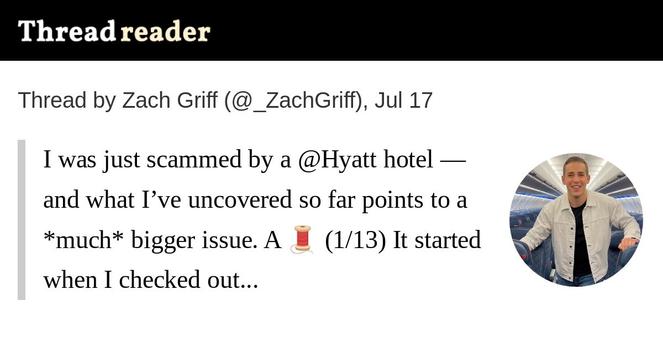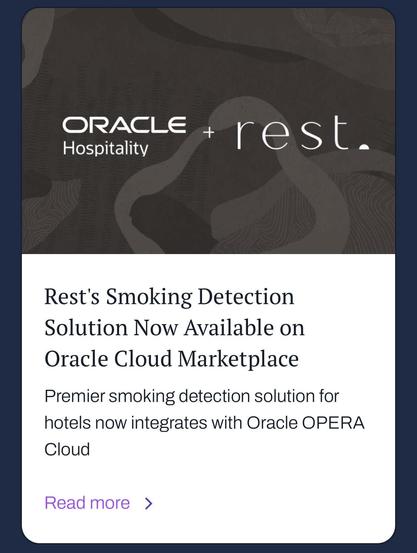Do not stay at a Hyatt hotel. They're running fake "smoking detectors" specifically as a revenue-generating scheme and arbitrarily fining guests $500.
@davidgerard What if ShotSpotter, but for smoking?
Incredibly, they pivoted from something ShotSpotter adjacent, presumably just as flakey
https://noiseaware.com/
BONUS: “Oracle Hospitality”
@davidgerard I know people really like earning points/miles/cash on their primary credit card(s), but temporal #s locked to a set limit, almost entirely prevent sketchy and double charges.
I'll take financial protection from scuzzy merchants (and their security breaches) over points & miles, any day.
@badsamurai @davidgerard a lot of nicer cards offer both a points/miles program and provide good protection for their customers; it’s definitely not either/or, and it’s worth researching
I don’t want to recommend products here, but I have two well-known cards that have done an excellent job with advocating for me and handling chargebacks when people do sketchy things.
Interestingly the article linked to says that they uncovered the same thing happening at other hotel chains using the same "revenue generating" smoke alarm product, so it's not just Hyatts...
@davidgerard How does this work?
Don’t you have to sign off the amount when you pay with your credit card?
I would just refuse to pay and let them sue… Does this work differently in the U.S.?
@davidgerard
@foo__ The per-authorization is also for a specific sum. I know what rate I booked. I allow them to make the pre-auth about 50$ higher but no more. A too high pre-auth would trigger a lot of red flags for me.
@masek @davidgerard Have you used a hotel before? You pretty much always pay with credit card, and that info is taken before you are even given a room.
And as they don't know that you'll even leave on time, eat at the hotel restaurant, drink some Pepsi or eat $15 bag of Doritos from the bar, catch up a bit on educational porn, they have no idea what your charges will be until after you check out and assess the room. They totally have free reign over the final dollar that gets charged to your card.
And any dispute is a civil matter. You could just pay it, negotiate it, or take it to court.
@ksaj @davidgerard I spend about 100 nights per year in hotels.
But those are all in Europe and that is why I ask. For this scam to work, there must be something different in the U.S. or the people make serious mistakes.
When I check into a hotel, they make a pre-authorisation of my CC. This is usually the sum for the booked stay plus some reserve for food or drinks. Usual the extra is about 50$. This pre-auth is acknowledged by me through entering the PIN.
I would expect everyone to pay attention to the sum pre-auth'ed. I do not allow them more than ~50$ extra. That way they cannot slap extra charges without me entering the PIN again.
I had hotels trying this. But every time I refused to pre-auth such a sum, they corrected it.
If they refuse, you should not stay there as it is a clear indicator of them wanting to do something fishy.
So I see two possibilities:
People don't look at what they pre-auth. That is a serious mistake.
The hotel has other ways to slap charges on a CC in the U.S.
First thing I would do is take the guy from the hotel to the room together and do a smell test together. Hopefully he will say there is no smoke detected and drop the charge. If not call the police. And get a written statement of whatever was said. Also written statement that you oppose the charge is very helpful. Alternatively to the police you can also try to get some witnesses.
@zinz @koteisaev I don't know what small town you might be from, but city police are far too busy for calls like that.
Police work on criminal matters... not civil ones. Take it to court as one does in civil matters. Unless you find something about smoking detectors in the local criminal code, there is zilch the police can or even will try to do.
@koteisaev @zinz If it isn't described in the criminal code, it is a civil case. The police won't get involved over a fee dispute. This is a classic in the civil court system.
It seems you are characterizing the scam as fraud, in which case it is criminal. But what is the likelihood you will succeed in a fraud case defined as what is clearly a civil complaint?
Very weird…



